Readings Newsletter
Become a Readings Member to make your shopping experience even easier.
Sign in or sign up for free!
You’re not far away from qualifying for FREE standard shipping within Australia
You’ve qualified for FREE standard shipping within Australia
The cart is loading…






This title is printed to order. This book may have been self-published. If so, we cannot guarantee the quality of the content. In the main most books will have gone through the editing process however some may not. We therefore suggest that you be aware of this before ordering this book. If in doubt check either the author or publisher’s details as we are unable to accept any returns unless they are faulty. Please contact us if you have any questions.
The use of fossil fuels results in rising CO2 and other greenhouse gas (GHG) emissions, causing global temperature rise and climate change that will negatively impact human health, the food supply, and eventually worsen hunger and misery. Presently, fossil fuels meet 88% of the energy demand, resulting in rising CO2/GHG emissions at alarming rates. The increased use of biofuels would help to mitigate climate change. Efficiently designing methods for the production of biofuels and plant-derived high-value products requires a deeper understanding of photosynthetic processes as a prerequisite for applying novel biotechnologies. Accordingly, this book provides ample information and a wealth of illustrative examples.
The book’s eighteen richly illustrated chapters are divided into three thematic parts. I: Photosynthesis and Biomass Production under Changing Conditions, II: Microalgae and Engineered Crops for Production of Biofuels and High-value Products, and III: Genetic Resources and Engineering Methods to Improve Crop Plants. Readers will find the latest information on the molecular basis of photosynthetic processes in plants (including the regulatory principles that allow plants to maintain homeostasis under changing conditions), stress resistance and synthetic pathways. In addition, the basic principles of important biotechnologies, as well as examples of specially designed crops capable of growing under stress conditions with improved productivity, are presented.
The book sets the course for future research in the field of biofuel development and production and provides both general and specific information for students, teachers, academic researchers, industrial teams, and general readers who are interested in new developments concerning the production of biofuels with value-added properties.
$9.00 standard shipping within Australia
FREE standard shipping within Australia for orders over $100.00
Express & International shipping calculated at checkout
This title is printed to order. This book may have been self-published. If so, we cannot guarantee the quality of the content. In the main most books will have gone through the editing process however some may not. We therefore suggest that you be aware of this before ordering this book. If in doubt check either the author or publisher’s details as we are unable to accept any returns unless they are faulty. Please contact us if you have any questions.
The use of fossil fuels results in rising CO2 and other greenhouse gas (GHG) emissions, causing global temperature rise and climate change that will negatively impact human health, the food supply, and eventually worsen hunger and misery. Presently, fossil fuels meet 88% of the energy demand, resulting in rising CO2/GHG emissions at alarming rates. The increased use of biofuels would help to mitigate climate change. Efficiently designing methods for the production of biofuels and plant-derived high-value products requires a deeper understanding of photosynthetic processes as a prerequisite for applying novel biotechnologies. Accordingly, this book provides ample information and a wealth of illustrative examples.
The book’s eighteen richly illustrated chapters are divided into three thematic parts. I: Photosynthesis and Biomass Production under Changing Conditions, II: Microalgae and Engineered Crops for Production of Biofuels and High-value Products, and III: Genetic Resources and Engineering Methods to Improve Crop Plants. Readers will find the latest information on the molecular basis of photosynthetic processes in plants (including the regulatory principles that allow plants to maintain homeostasis under changing conditions), stress resistance and synthetic pathways. In addition, the basic principles of important biotechnologies, as well as examples of specially designed crops capable of growing under stress conditions with improved productivity, are presented.
The book sets the course for future research in the field of biofuel development and production and provides both general and specific information for students, teachers, academic researchers, industrial teams, and general readers who are interested in new developments concerning the production of biofuels with value-added properties.